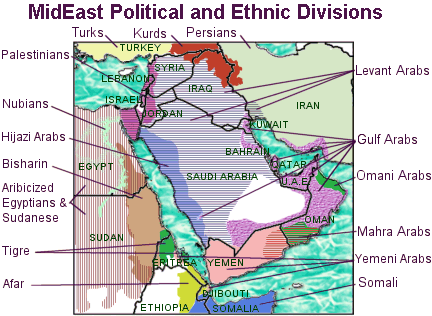Egypt and the Persian Gulf
people profile

The lands of Bright Star and Desert Shield exhibit high contrast and rapid change. Wealth and poverty dwell together in modern cities while Bedouins roam the desert as they have for thousands of years.
Once united into the world’s dominant empire, Middle Eastern peoples are now divided from natural resources and each other by ancient rivalries and supervised national boundaries. Oil money, population pressures, and feelings of resentment are fueling the activity of radicals while inferiority and instability create unprecedented opportunities for the gospel.
Although the cost of following Jesus is high, allegiance to him in many minority communities remains steadfast, and the loyalty of many Muslims is switching.
Saudi Arabia is immune to international opinion. It boasts a quarter of the world’s oil and the world’s worst religious persecution. Converting from the state religion results in execution. Public and private lives are tightly controlled. Islam’s holiest properties must not be defiled. Religious police (muttawa) harass, arrest, imprison, and sometimes deport expatriates who practice other faiths too seriously. Few expatriate Christians have meaningful contact with Saudis, but the number of secret believers in Jesus is increasing.
Kuwait is a wasteland blooming on oil. Sixty percent of its people are immigrant workers. Although religious freedom for citizens is legally guaranteed, any who adhere to non- Muslim faith publicly may have to flee for their lives. Expatriates run two Catholic churches and five Protestant churches. The National Evangelical Church sponsors at least twenty-five ethnic fellowships and holds worship in English, Arabic, Urdu, and Malayali.
Bahrain takes the concept of "off-shore investing" into the realms of publishing and entertainment. Visitors returning to Saudi across the causeway expect to be searched for videos, magazines, and Bibles. Besides providing a haven for various carnal activities, these oil producing islands host the well respected American Mission Hospital, a busy Christian bookstore, and a congregation of evangelical Arabs, as well as many expatriate Christian communities.
Qatar is seventy percent immigrant workers. The oil rich absolute monarchy regulates non-Muslim religions closely. There is an Anglican church, and expatriate believers may fellowship in private homes.
The United Arab Emirates flourishes on oil and immigrant workers who comprise seventy-five percent of the population. Prosperity has made the indigenous Gulf Arabs more cosmopolitan and open to new ideas, but it has also agitated radical fundamentalism. Expatriate Christians worship in English, Arabic, Urdu, Filipino and Indian languages and have considerable freedom. Two Christian organizations have medical ministries.
Oman also has oil and many expatriate workers who are free to worship as they choose. The first Protestant missionary to Muslims, Samuel Zwemer, began his work here in 1890. His heritage of hospitals and clinics with missionary workers continues under the government health service and the Reformed Church of America.
Yemen has no oil, few expatriates, and very few Christians. The whole country of sixteen million has only two churches. One is Catholic, and one is Protestant. These are expressly for expatriates in the capital city. Refugees from wars just across the Red Sea present a challenge. Friction continues between fundamentalist and moderate factions of the once divided north and south. Striking scenery of arid deserts contrasting with lush mountains seems appropriate in a land of beautiful hospitable people living in squalor amidst civil unrest.
Egypt has more Christians in its population of over sixty million than each of the oil rich Gulf states has people. Protestants and Catholics number hundreds of thousands and Orthodox Copts exceed many million. Bibles, tracts, tapes and videos are freely bought and sold, but Christians in Egypt face heavy discrimination. Theirs is a quaint superstition that belongs on the reservation as a tourist attraction. Public demonstrations of vitality are severely persecuted. For their presence and tenacity, Egyptian Christians are begrudged and hated by many.
Jordan hosts the Arab world's only evangelical seminary. Students from all the neighboring countries attend. Most Christians in Jordan are Arabs. They occupy all walks of life, including many respected and powerful positions. Jordan's constitution guarantees freedom from discrimination. It also forbids conversion out of Islam. Catholic, Protestant, and Orthodox Jordanians minister to their own, convert one another, and try to avoid unsettling the Muslim majority.
Iraq was the first Arab country to show the JESUS film on national TV. Its national newspaper printed devotionals from the "Daily Bread" every day of 1999. The "secular" government forbids converting Muslims, but protects freedom for Christians to worship in fourteen recognized denominations. Some of churches use liturgies in the same Aramaic dialect spoken by Jesus. Political oppression and economic sanctions inflict more misery than religious persecution. Freedom of expression and association is curtailed so that home Bible Studies are not allowed. Iraq's wealthiest third of Christians have fled the country's depressing poverty.
Resouce Contact Information
| Resource Contact Information | ||
| Resource | Phone Number | Web Site / Address |
| Mid-Eastern language JESUS Videos | 1-800-560-8713 | www.jesusfilm.org |
| Mid-Eastern Language Audio Tapes: | 1-760-745-8105 | www.gospelcom.net/asi |
| Mid-East Language Gospel
Radio: World by 2000 Database |
1-719-548-7490 |
www.wb2000.org |
| Mid-Eastern Language
Scriptures: International Bible Society American Bible Society Scripture Gift Mission |
1-800-524-1588 1-800-322-4253 1-877-873-2746 |
www.gospelcom.net/ibs www.americanbible.org www.gospelcom.net/asgm |
| Mid-East Language Christian
Books: Multi-Language Media |
1-717-738-0582 |
www.multilanguage.com |
| Ministry Tools & Info | 1-303-730-4170 | www.calebproject.org |
| Bible Correspondence
Courses in Arabic and other On-Line tools |
1-719-574-5900 | www.vopg.org |
Agency Contact Information
| Agency Contact Information | |||
| Agency | Phone Number | Web Site | |
| Arab World Ministry | 1-800-447-3566 | www.awm.org | |
| Christar | 1-800-755-7955 | www.christar.org | |
| Christian Aid Mission | 1-800-977-5650 | www.christianaid.org | |
| Frontiers | 1-800-GO-2-THEM | www.frontiers.org | |
| InterServe |
1-610-352-0581 |
www.interserve.org |
|
| SBC - IMB |
1-804-219-1000 |
www.imb.org |
|